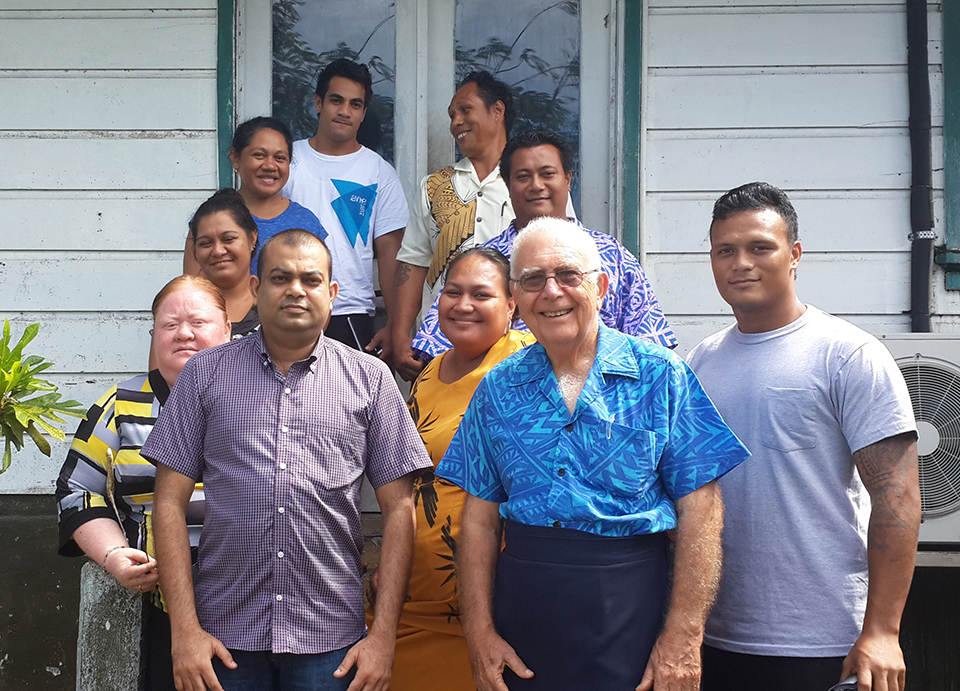
METI works as a community development organisation through a small training team of eight qualified trainers who deliver training to the people in the villages. On this basis, they can reach only a few people. To scale up their training, METI needed a different approach.
METI developed a model in which select people from the rural villages were chosen for special training to enable them to deliver METI’s programmes to the villages. These select people were referred to as Taiala (Samoan for ‘path-breakers’) or community development workers in Samoan villages. Among the Taiala are retired public servants and ‘housewives’. METI aims to expand the number of Taiala to 50 who will work across 50 of Samoa’s 300 villages.
In 2012-2013, COL supported the training of the 8 METI staff as Life Skills Coaches which contributed to their achieving a qualification recognised by the Samoa National Qualifications Authority. Their training continued in September 2013 with mentoring of the group as they delivered cascaded training to the Taiala.
In January 2014 METI’s internal team of trainers were trained to write self- instructional materials. They in turn would work with the Taiala, based on the training they received. The focus of the workshop was on producing a self-instructional manual on Permaculture that is targeted at the Taiala entitled: Introduction to Permaculture: A self instructional manual for TAIALA.
The workshop outputs included developing profile of learners in order to inform the materials design; a course blueprint and the Life Skills Coach Training Manual to be used with the Taiala. The workshop also focused on clarifying the difference between copyright and OERs and introduced Creative Commons licensing as well as raise awareness about gender-sensitive writing.
The benefit to METI of having the Life Skills Coach Training Manual is that previously, all the collective wisdom and training content of METI was held by the Director. They are now in a stronger position for the future with resource based learning.
In September 2014, COL hired a consultant to review the existing materials, design and facilitate further capacity building on instructional design, and review the revised learning materials after the team had edited and developed them.
The training workshop reviewed the Permaculture Programme which comprises 12 lessons relating to the various permaculture principles and the development of sustainable and self-sufficient agricultural ecosystems. The Healthy Living Programme is a two hour seminar which seeks to address the increasing threat in Samoa of non-communicable diseases (NCDs) – particularly diabetes, obesity and hypertension by encouraging participants to adopt a wholefood, plant based diet.
During the workshop, participants were able to make significant progress in revising the materials for the healthy living seminar and they were able to revise 3 of the 13 lessons in the Permaculture programme. Following the workshop, they completed the revision of the full course, the consultant carried out a review and provided feedback. This course is now available as an OER on the COL website.
COL supported social media training for NGOs in Samoa, including METI in 2014. This helped the METI training team to understand how the power of social media might be harnessed to help them stay in contact with Taiala and to reach more community members.
The METI Executive Director, Dr Walter Vermeulen stated that working with COL and particularly with Dr Alison Mead Richardson, the COL ES, has been ‘a very gratifying experience’.
COL’s support over the past three years has been catalytic and strategic for both METI and COL.
At this stage, much of the work has focused on putting systems in place such as the training materials and getting the Taiala trained. The next steps which will focus on expanding the programme, will need to integrate monitoring and evaluation in order to ascertain the effect of the programme on growing the capacity for sustainable development and livelihoods in the villages.


